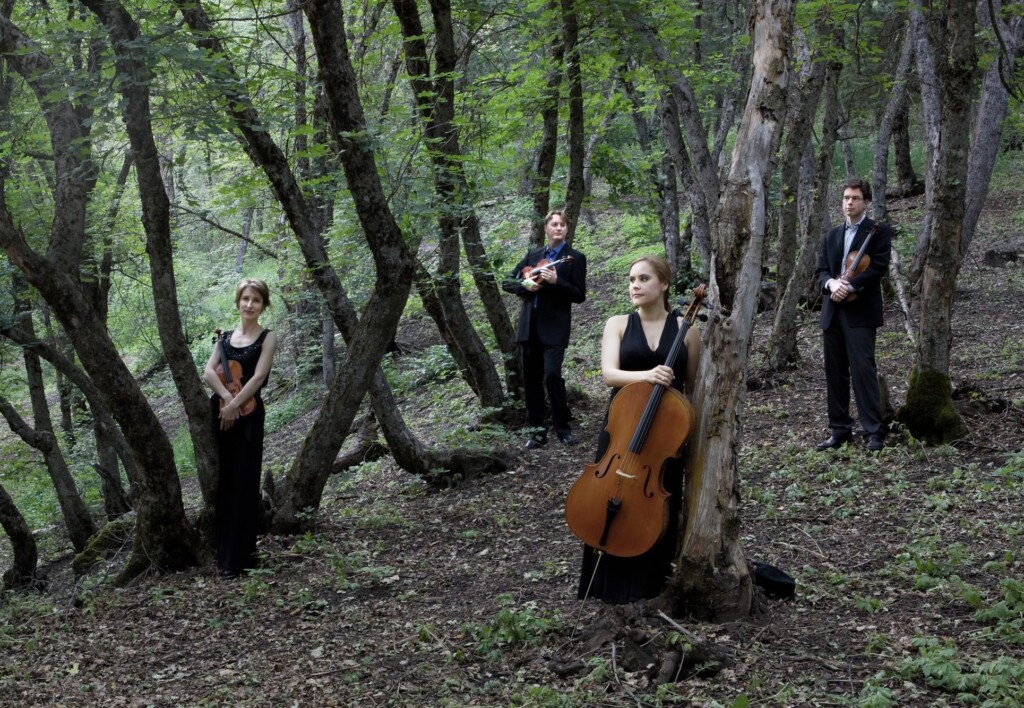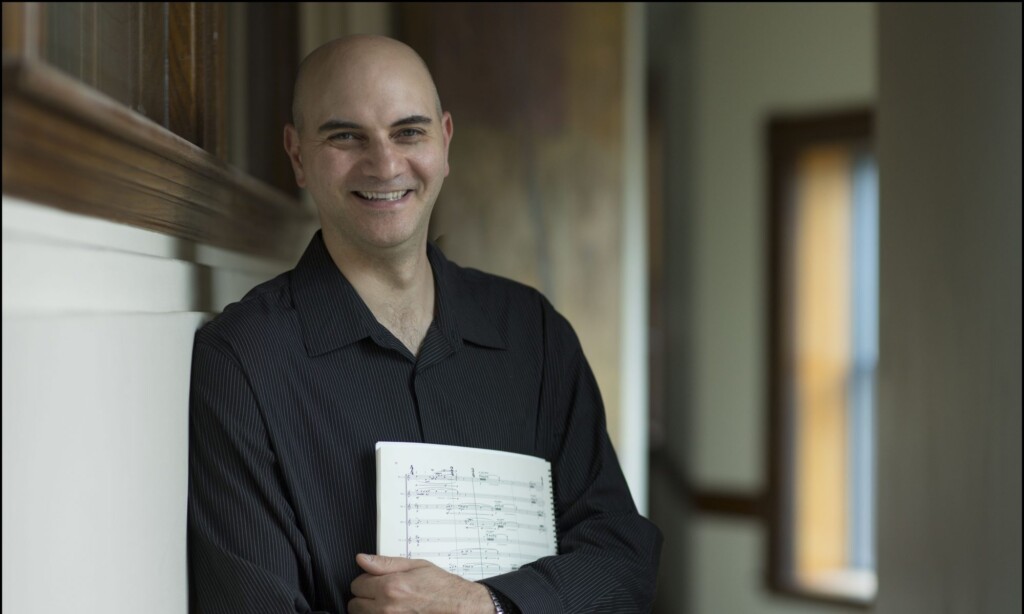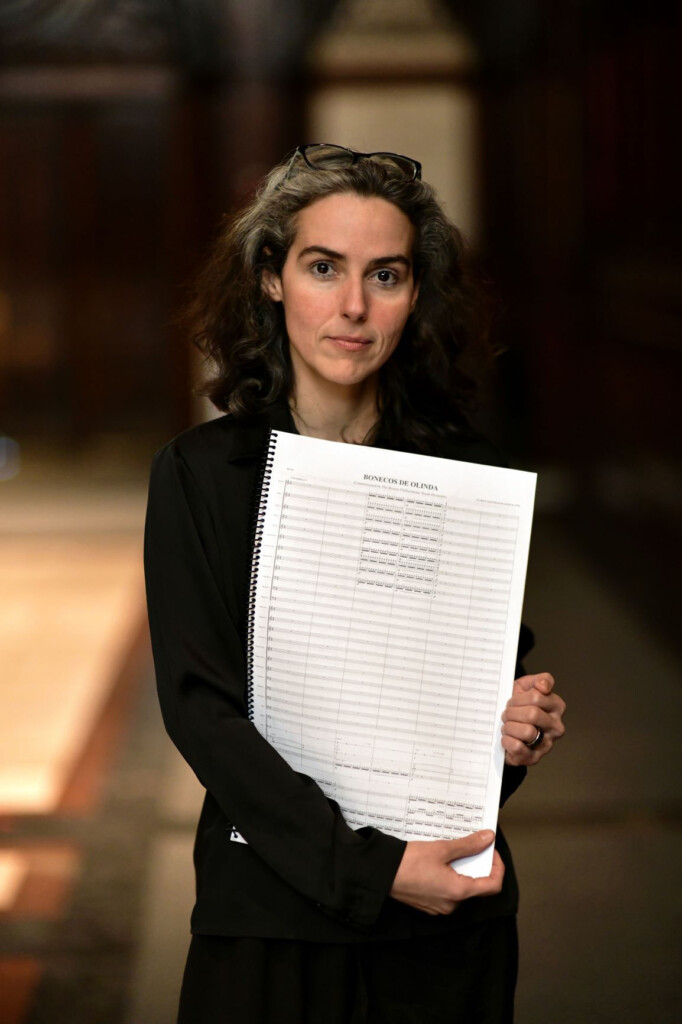The last live NOVA Chamber Music Series concert before the COVID-19 pandemic shuttered all live performances in the city occurred on March 1, 2020, a program featuring music by Nordic composers performed in the Utah Museum of Fine Arts’ Great Hall. In the last 18 months, NOVA has stayed visible with a series of virtual on-demand concerts and podcasts but if a free, public outdoor concert offered Sept. 12 at The Gallivan Center in downtown Salt Lake City by NOVA was any indication, musicians and audience members are thrilled at the prospect of returning to NOVA’s performing home at the Libby Gardner Hall at The University of Utah.
With the Fry Street Quartet, the ensemble in residence at Utah State University, returning in their unique roles as NOVA’s co-music directors, the new season will feature six concerts at Libby Gardner and one gallery concert at the Utah Museum of Fine Arts. Some of the concerts will feature works originally scheduled during the remainder of the truncated season but most of the programming is from scratch.
The season is best described, in the words of Robert Waters, the quartet’s first violinist, as not “your grandparents’ chamber music concerts of Mozart and Beethoven.” There is only one Beethoven work in the season, and appropriately enough, it is one of the composer’s last works signifying a song of thanksgiving and joy. There are two works from before 1700 and just a handful of works from the 19th and 20th centuries, including Clara Schumann, Prokofiev, Brahms, Dvořák, Bartók and Samuel Coleridge-Taylor. One work is a 1944 string trio written by Gideon Klein which is believed to be the last piece of music he wrote while imprisoned at a Nazi concentration camp.
The rest is an impressive bounty of 21st century composers, with a solid representation by female composers. For example, female composers — Clarice Assad, Gabriela Lena Frank and Jessie Montgomery — will have works performed on two separate concerts. There are several premieres in various concerts. As Anne Francis Bayless, Fry Street Quartet cellist, notes, the programming reflects their “deep desire to showcase composers from underrepresented demographics and bring awareness to their music.”
The first Libby Gardner Hall concert Songs of Gratitude (Oct. 10, 3 p.m.) brings the audience back into the familiar brand of juxtaposed programming for which NOVA is well known. “We thought long and hard about the best way to welcome people back into the hall in a lovely way,” Waters explains. The program is bookended by works of two composers who need no introduction: Beethoven’s Heiliger Dankgesang, Opus 132, featuring the emotional centerpiece of a song of thanksgiving and joy, written in the next to last of the 16 string quartets he composed, and Brahms’ String Sextet No. 2 in G major, Opus 36. Meanwhile, Brittany J. Green’s …to experience life offers a solid contrast in expression of gratitude. The young composer, based in North Carolina, incorporates electronics and bits of sound, video and text into her works. The Green composition was premiered in 2019 by the Splice Ensemble at a Western Michigan University concert. The eight-minute work is scored for trumpet, piano, percussion and electronics. Another contemporary highlight will be Clarice Assad’s Metamorfose, scored for viola and piano. Utah audiences may remember her performance at the Utah Arts Festival in 2016. Assad comes from one of the world’s best known musical families, which includes the Assad Brothers: her father (Sergio) and her uncle (Odair). An award-winning opposer with numerous international commissions, Assad fuses elements of her Brazilian heritage into her music that handily synthesizes jazz, symphonic and experimental features.
NOVA returns to Libby Gardner Hall on Nov. 14 at 3 p.m. with Songs of Life, a concert that Waters describes as “an unusual program for NOVA, cutting a pretty wide swath of different performers and instrumentation, that is fun and even sometimes rowdy with unfettered energy.” Jet Whistles by Hector Villa-Lobos sets the tone for the afternoon, a piece scored for cello and piano, which Francis says is “unmistakably fun to play.” Gabriela Lena Frank’s Milagros (2010) picks up the relay baton in a work of eight short movements for string quartet based on snapshots of life relating to motherhood and infancy in Peru, both past and present. The Fry Street Quartet and Frank have cultivated an extensive relationship, as the composer has worked with students at Utah State University, where the quartet is based. She also will be part of a forthcoming academy program for emerging composers. Two years ago, a NOVA concert featured Frank’s trio for flute, clarinet and piano, Canto de Harawi: “Amadeoso”, which was composed in 2005, and emanated from the composer’s Peruvian heritage and her childhood dreams about meeting Mozart, as inspired by her love of the Amadeus film.
The concert also will feature Neil Thornock’s Blur, a musical sparring between two percussionists, followed by Get Along Little Doggies. Utah composer and musician Devin Maxwell (Red Desert) casts this piece as akin to the vibe of the earlier Villa-Lobos piece but bustling instead with Wild West raucousness. Rounding out the concert will be Alfred Schnittke’s absurdist Serenade and Maurice Ravel’s Introduction and Allegro, scored for harp, flute, clarinet and string quartet but really the work is a bona fide concerto for harp.
The 2022 portion of the season will open in Libby Gardner Hall with Songs of Perseverance (Jan. 16, 3 p.m.), including works by Jessie Montgomery, Wang Lu, Gideon Klein and Clara Schumann. Montgomery’s Source Code is based on a unique rendering of the syntax in Black spirituals while Wang’s Rates of Extinction is a mournful piece based on the heart rates of animal species that have gone extinct. The piece is accompanied by projected images of the extinct species. The string trio by Gideon Klein, composed in 1944, reflects perseverance in the most heart-breaking way. Klein, still in his twenties, was a gifted musician who was incarcerated in the Terezín Concentration Camp, where many creative and artistic individuals were detained. Klein was among the musicians who organized concerts and composed works to be performed in the camp. In his last months, at the age of 26, he was eventually transported to Fürstengrube, where he most likely died although the details have never been conclusively documented.
Heralding spring, the Songs of Play concert at Libby Gardner (March 13, 3 p.m.), returns to NOVA’s unique juxtaposing programming brand with two bookends being quintets representing composers of entirely different backgrounds: Sergei Prokofiev, a 20th century Russian composer of the Soviet era, and Samuel Coleridge-Taylor, the Anglo-African composer of the late 19th and early 20th centuries. This concert also will feature two world premieres, a new yet untitled work by Stephanie Boyd and Counterplay by Luke Dahn. Boyd, a Michigan native who works in Manhattan, composes melodic music about women’s memoirs and the natural world for symphonic and chamber ensembles. Her portfolio includes commissions from 37 countries. Dahn, who serves on The University of Utah music faculty, also has an extensive international portfolio of commissions and performances of his work. Dahn also is co–founder and co–artistic director of Ensemble Périphérie, which made its Carnegie Hall debut in 2013, and serves on the board for the League of Composers/ISCM in New York.
Songs of the Americas (April 10, 3 p.m., Libby Gardner) will feature works by three composers already represented in earlier concerts of the seasons: Gabriela Lena Frank, Jessie Montgomery and Clarice Assad. These include Four Folk Songs by Frank; Loisaida, My Love by Montgomery, for cello and mezzo-soprano, which celebrates the history of Puerto Rican activism in New York City’s Lower East Side, and Canções da America by Assad, a string quartet commissioned for a Utah State University debut in October with the Fry Street Quartet. Anthony R. Green’s Gettysburg Address is a 2010 work that is part of a series of compositions he has written in artist residencies in national parks such as Gettysburg, Hawaii Volcanoes, Chaco Canyon, Death Valley and Dry Tortugas, courtesy of funding from the National Parks Arts Foundation. This concert theme would not be complete without highlighting selected songs from Charles Ives, an American composer who has yet to receive his full due merit as one of the country’s most important musical figures.
The Libby Gardner season close will be Songs of Migration, (May 1, 3 p.m.), a wonderful sample of works signifying cross-cultural fertilization in music. No NOVA season with Fry Street Quartet at the helm would be complete without at least one work by Béla Bartók: Six Dances in Bulgarian Rhythm. This is the last set of pieces in the final volume of his ethnomusicological masterpiece Mikrokosmos. Perhaps the quintessential metaphor of migration, Butterflies Remember a Mountain is a 2013 work by Arlene Sierra, a London-based musician named last year as composer-in-association with the Utah Symphony.
The concert will see the North American premiere of Tesserae, a piece by Syrian-American composer Kareem Roustom, who works in many different genres and settings. The work, based on an Arab folk song, is scored for standard brass quintet. His commissions have included the West-Eastern Divan Orchestra, the Kronos Quartet, arrangements for pop icons Shakira and Tina Turner, as well as a recent collaboration with British choreographer Shobana Jeyasingh. The concert will close with Antonín Dvořák’s String Quintet, Opus. 97, which also happens to carry the American title, just as with his famous string quartet. The composer wrote this during his stay in a tiny Iowa town which reminded him of his own rural roots in his native Bohemian land.
NOVA’s only gallery concert of the season will be an all-British program — Britten, Dowland and Purcell — in the Great Hall of the Utah Museum of Fine Arts (Feb. 20, 3 p.m.). The Fry Street Quartet had performed Britten’s Third String Quartet in a previous concert at the museum and this time will present the composer’s String Quartet No. 2 in C major, Opus 36. The concert will open with Britten’s Fanfare for St. Edmundsbury, scored for three trumpets, followed by excerpts from John Dowland’s First Book of Songs or Ayres, a composer of the 16th century and 17th century. The Dowland songs, performed by soprano and flute, will be followed by Britten’s Lachrymae, scored for viola and piano, and which includes a direct quote from one of the Dowland songs. The concert also includes Henry Purcell’s Fantasia Upon One Note, an intriguing three-minute piece written in 1680 when the composer was 21. Scored for five instruments, the piece revolves around a middle-register instrument playing a single note throughout the length of the music. In a 1946 recording of the piece with the Zorian Quartet, Britten played the second viola part, which was to sustain the open string pitch throughout the length of the composition.
Tickets and more information are available at the NOVA website. Concert attendees will be required to show either proof of vaccination or a negative COVID-19 test prior to admission. Likewise, audience members will be required to wear masks during the concert.






